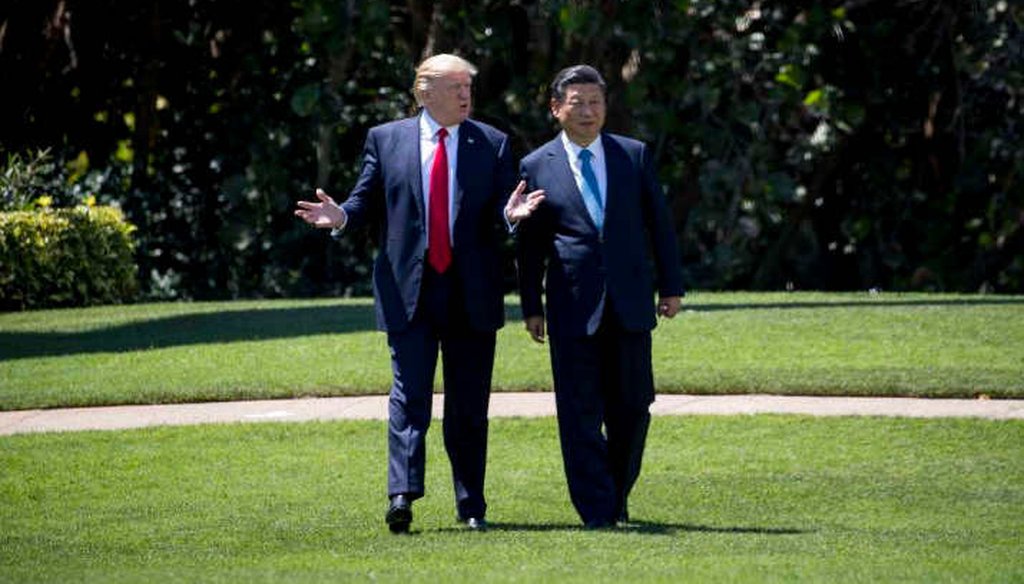Get PolitiFact in your inbox.
Trump threatens to ignore WTO in 'aggressive' America-first approach

President Xi Jinping of China walks with President Donald Trump at his Mar-a-Lago resort in Palm Beach, Fla. (New York Times)
President Donald Trump promised as a candidate that he would reverse China's membership in the World Trade Organization, which had been approved by the international group during the Clinton administration.
His promise is part of an attempt to penalize China for undercutting American manufacturers.
Already, his administration has sent a big signal that it could take unilateral action to protect American workers in an annual trade policy report.
In March 2017, the White House introduced an outline of the new trade approach to Congress, which included a sharp shift from existing trade policy. The White House vowed to ignore the World Trade Organization if necessary to advance American interests and promote trade of American goods.
The report did not specifically mention reversing China's membership in WTO. One explanation might be that it's not legally possible.
Before we get into what the report says, here's some important background: China sought membership in the group of nations that developed rules for international trade. The country needed approval from two-thirds of WTO members, so China worked to develop trade deals with all of them, including the United States.
President Bill Clinton made a successful push in 2000 for Congress to grant China normal trade rights, dropping several tariffs and trade barriers for the emerging global power. Before then, those rights had to be revisited each year.
In 2001, the 142 WTO member nations — including the United States — voted unanimously to accept China, with some special conditions attached.
Jeff Schott, a senior fellow at the Peterson Institute for International Peace, said Trump cannot actually reverse China's entry into the WTO. Trump can, however, withdraw from the WTO himself and thereby deny China the access to U.S. markets it obtained by joining the WTO.
The White House hasn't gone that far, but they have already taken some steps to disregard the group.
In particular, the Office of the U.S. Trade Representative report said, "It is time for a more aggressive approach. The Trump Administration will use all possible leverage to encourage other countries to give U.S. producers fair, reciprocal access to their markets."
The report cited data that shows that U.S. industrial production grew by almost 71 percent from 1984 to 2000, but only grew by less than 9 percent between 2000, the last full year before China joined the WTO, and 2016.
"These figures indicate that while the current global trading system has been great for China, since the turn of the century it has not generated the same results for the United States," the report said.
This new approach would give the United States the possibility to impose tariffs on countries that they think have unfair trade practices without the consent of the other members in the WTO.
Chinese foreign ministry spokesman Geng Shuang responded to the administration's announcement by saying that China's own support for the WTO would not change.
Trump has not pursued steps to reverse China's membership in the WTO, because he can't make such a decision unilaterally. But the administration's trade policy does indicate that the United States is prepared to ignore the WTO to advance its own trade goals unilaterally.
We rate this promise In The Works.
Our Sources
Politico, Full transcript: Donald Trump's job plan speech, Jun. 28, 2016
The New York Times, The China trade vote: A Clinton triumph; House, in 237-197 vote, approves normal trade rights for China, May 25, 2000
Slate.com, "Waking the Sleeping Dragon," Sept. 28, 2016
The New York Times, Experts warn of backlash in Donald Trump's China trade policies, May 2, 2016
The Washington Post, Trump suggests ignoring World Trade Organization in major political shift, Mar. 1, 2017
Office of the United States Trade Representative, 2017 Trade Policy Agenda 2016 Annual Report of the President of the United States on the Trade Agreements Program, Mar. 1 2017
Reuters, China says supports WTO after U.S. trade threat, Mar. 2, 2017
E-mail interview with Jeff Schott, Apr. 25, 2017